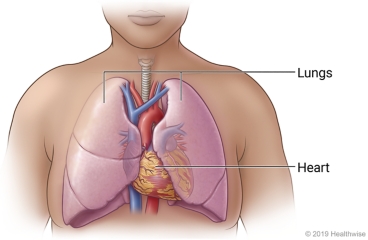
Your Care Instructions
Shortness of breath has many causes. Sometimes conditions such as anxiety can lead to shortness of breath. Some people get mild shortness of breath when they exercise. Trouble breathing also can be a symptom of a serious problem, such as asthma, lung disease, emphysema, heart problems, and pneumonia.
If your shortness of breath continues, you may need tests and treatment. Watch for any changes in your breathing and other symptoms.
Follow-up care is a key part of your treatment and safety. Be sure to make and go to all appointments, and call your doctor if you are having problems. It's also a good idea to know your test results and keep a list of the medicines you take.
How can you care for yourself at home?
- Do not smoke or allow others to smoke around you. If you need help quitting, talk to your doctor about stop-smoking programs and medicines. These can increase your chances of quitting for good.
- Get plenty of rest and sleep.
- Take your medicines exactly as prescribed. Call your doctor if you think you are having a problem with your medicine.
- Find healthy ways to deal with stress.
- Exercise daily.
- Get plenty of sleep.
- Eat regularly and well.
When should you call for help?
Call 911 anytime you think you may need emergency care. For example, call if:
- You have severe shortness of breath.
- You have symptoms of a heart attack. These may include:
- Chest pain or pressure, or a strange feeling in the chest.
- Sweating.
- Shortness of breath.
- Nausea or vomiting.
- Pain, pressure, or a strange feeling in the back, neck, jaw, or upper belly or in one or both shoulders or arms.
- Lightheadedness or sudden weakness.
- A fast or irregular heartbeat.
Call your doctor now or seek immediate medical care if:
- Your shortness of breath gets worse or you start to wheeze. Wheezing is a high-pitched sound when you breathe.
- You wake up at night out of breath or have to prop your head up on several pillows to breathe.
- You are short of breath after only light activity or while at rest.
Watch closely for changes in your health, and be sure to contact your doctor if:
- You do not get better over the next 1 to 2 days.
Where can you learn more?
Go to http://www.healthwise.net/patientEd
Enter S780 in the search box to learn more about "Shortness of Breath: Care Instructions".
Current as of: August 6, 2023
Author: Healthwise Staff
Clinical Review Board
All Healthwise education is reviewed by a team that includes physicians, nurses, advanced practitioners, registered dieticians, and other healthcare professionals.

